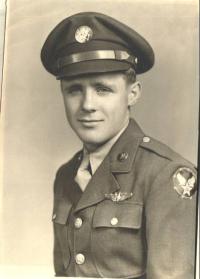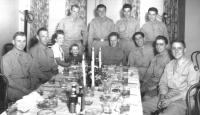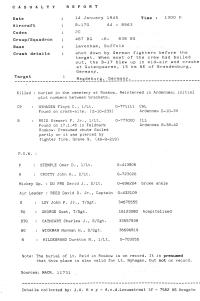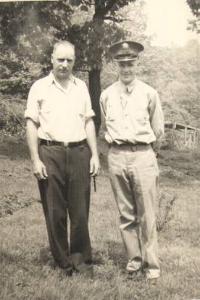

 |
 |
| Stalag VII A: Oral history |
| Charles John Cathcart |

From Brandenburg to MoosburgCharles John Cathcart, a member of the 838th Squadron, 487th Bombardment Group, 3rd Air Division of the 8th U.S. Army Air Force, was shot down over Brandenburg, Germany, on January 14, 1945. He was trained as a ball turret gunner but, on this mission he was acting as a waist gunner. The crew of Omar Stemple, that he flew with, were a lead crew that flew in the High Squadron. The ball turret was replaced with the radar during these missions. "January 14, 1945 was a beautiful, sunshiny day and our parachutes glistened like new dimes in the sun. Making them easy to pick out and locate as we drifted to earth. Unfortunately, it was an unfriendly part of the earth, a village near Brandenburg. Myself, and about a half-dozen other bailed-out Americans in the vicinity were rounded up and captured by the "home army" of Germany - the men too old and the boys too young to fight on the front of Hitler's campaign of terror. The Germans were fully armed and "let the authority show" as they herded us toward the village. The long march into the town jail was accompanied by the young Germans' hitting us with sticks and rocks, and spitting on us. I guess they had been trained to do that. They had been trained to hate ... I guess. I learned early on that under the stress of the moment, anybody can turn ugly." 
"I was provided with my most lasting, haunting memory of my captivity as a prisoner of war when we passed by an old woman standing beside a picket fence. The woman was weeping and I've wondered so many times since then; why was she weeping? Was it out of sympathy? Did she have a son in the army? In any case the old woman represented the only display of compassion the Germans expressed to the fallen airmen. I can still see her now ... weeping. She was such a striking contrast to the hatred of the beating, spitting youths." "We were then transferred from the town jail to Dulag Luft. They tried to interrogate us in German and when we couldn't respond, they would slap us. We were interrogated constantly, beaten and threatened with death. You have no idea what it is like to be all alone in a cold dark dungeon...to have the door suddenly open and think they were coming to hang you." 
"After 3 days at Dulag Luft we were herded onto cattle cars, so tight you couldn't move and trained toward another camp, Stalag XII ID in Nuremberg. 99 percent of the people in the cattle cars were sick with dysentery. There were horrible odors and stenches. The train ride lasted at least 24 hours and if you had to go to the bathroom, there was no room, no place to go, so you just went .. .everybody was sick." "Conditions at Stalag XIII D were a little bit better than in Dulag Luft. At least there were barracks and "beds" ( boards covered with burlap mattresses filled with straw). We had no baths from the time we were captured. You could wash your face in a trough outside the barracks or take a sponge bath but, all of us had body lice and we would sit around like a bunch of monkeys and pick lice off each other. All of these things you can't romanticize, like they do in Hollywood movies. The fleas, the vermin, the lack of food and clothing. The food situation had not improved much though. We each got three thin slices of German black bread, usually well laced with saw dust and a cup of ersatz coffee or tea - per day. The worst part of the entire experience, was watching people starve to death; watching them get so malnourished that they'd black out and fall down when they tried to get up." "Little did we know at the time, the horrors that were taking place in the nearby shower house. The house was in sight of the compound and we used to see Jewish people taken into the shower houses ... but we never found out what was going on there until we got out." "Despite the hunger and the general unhealthy and cruel situation in which we suffered during the winter, I felt no vengeance toward the guards. They were all old men and they were just part of the system. I almost felt sorry for them. I felt they were caught up in something ... just as I was." "You had to learn to laugh at yourself to keep your sanity. One cause for restrained joy was how we worked the rationing system. They would bring the bread to us, open, on a wagon, and they would toss the loaves into the barracks. We would authorize certain people to cut the loaves, and then we drew cards each day to see who'd get first pick (of his three slices). The guy who go the last pick had to eat the bread that was handled, many, many times, by the others, comparing and weighing. He often had to eat dirty, crushed bread ... sometimes rats had gotten to the bread. It was funny to sit back and watch the face of the man who got the last pick." "There were times for sharing and compassion, though. One Sunday a warrant officer finagled some vinegar out of the guards and we had a communion service on what we determined to be Easter Sunday, with vinegar and black bread." 
"Sometime in the spring we were moved southeast to Stalag VII A. Here the barracks were replaced by tents and the board-beds were were replaced by canvas covered ground. We each had about half a blanket. One day in mid-May, 1945, we were awakened very early in the morning by the sound of aircraft, flying at tree top level. It was American aircraft. We later heard artillery, and the shells whistled over our heads. After a very brief battle the guards fled and we saw the tanks breaking down the fences to the compound. The prisoners were elated. Some, sadly, couldn't wait and were cut down as they tried to scale the barbed wire fences during the battle." "The American rescuers shared their K-rations with the starving prisoners. Before we hadn't thought much of K-rations but they tasted pretty good at that time. As the Nazi swastika was taken down from the flag pole and the American flag raised in its place, grown men wept...that experience was one of deep reflection. It was then that I realized how much we take for granted and how little we appreciate the freedoms..."
|
| Last update 4 Jan 2007 by © Team Moosburg Online - All rights reserved! | |||